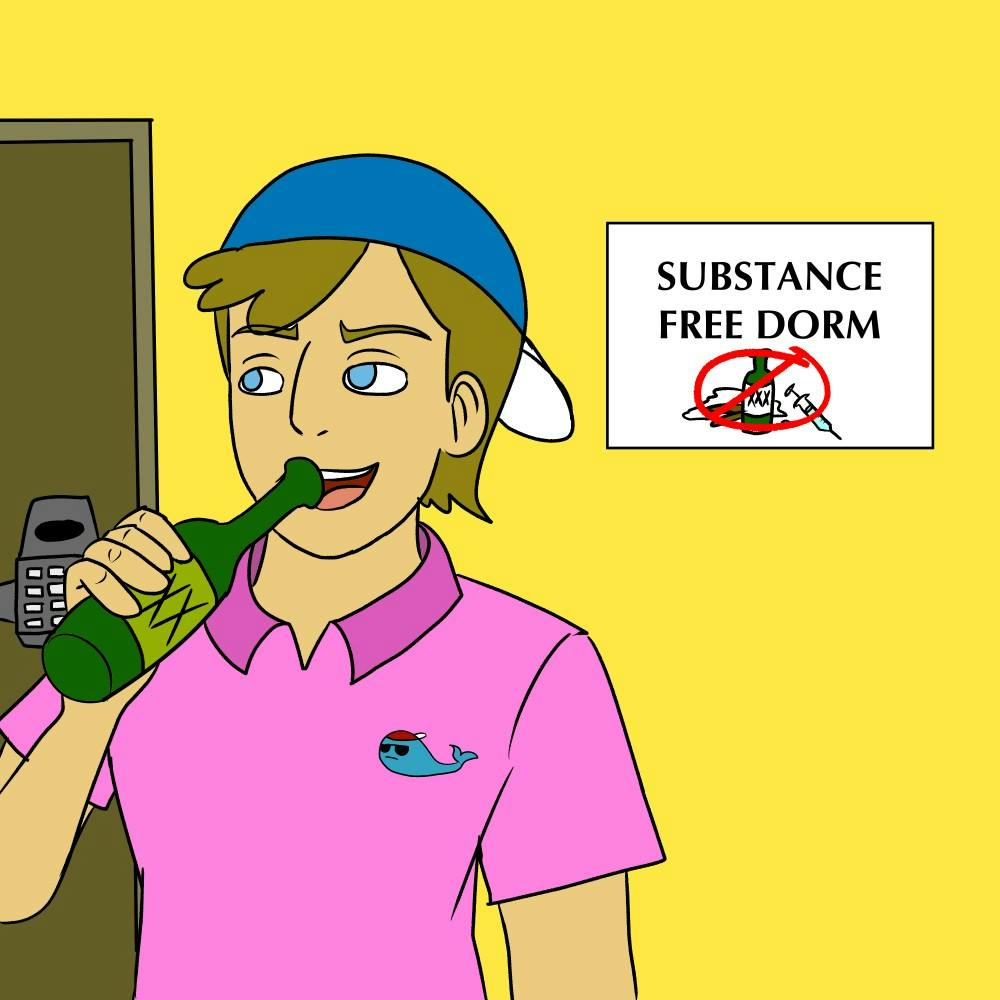A cornerstone of the college experience is receiving a freshman housing assignment and learning to live with people you have never met in an entirely new location. Conversely, another key component of college is finally getting to make choices about with whom you are going to the room, where you are going to room, and, at this University, whether or not you would elect to live in substance-free housing. Yet our substance-free housing system is flawed because it intersperses substance-free and substance-permitting rooms, negating nearly all of the benefits that substance-free housing is supposed to offer.
The University should make certain secluded dormitories on campus entirely substance-free and make the majority of dormitories substance-permitting, especially considering that room draw is just one week away.
To perform an effective evaluation of substance-free housing at the University, we must understand the reasons why one would even choose to live in substance-free in the first place. If it were just because a student did not want to use substances in their own room, then the entire system would be ridiculous. They could live in any dorm on campus and choose to not have substances there. Additionally, Fire Safety only inspects rooms a couple of times a year, and even then, they may not see the substances.
One of the most obvious reasons a student would want to live in a substance-free dorm is to avoid other students in substance-permitting dorms who may spend several nights a week drinking and being incredibly loud. This activity gets in the way of work, sleep, or relaxation – or possibly causes other forms of distress due to a substance addiction or religious aversions to substance use.
The assumption behind living in substance-free housing is that the people surrounding you are also substance-free. But in our current system, substance-free areas are located too close to substance-permitting areas, which means students who live in many substance-free rooms can easily hear the noise from down the hall or down the stairwell from substance-permitting rooms. There is no use in being substance-free unless all the rooms near you are as well, including rooms in other dormitories in the nearby vicinity.
I experienced this issue when living on the third floor of Little Hall during the 2017–2018 school year. About half of the hallway consisted of substance-free singles, and another half substance-permitting rooms. The second floor was also substance-permitting, and the stairwell was right next to the substance-free singles. There were many weekends when the substance-free section was filled with the noise coming from the other areas, as well as many visits by public safety to the area.
Substance-free students were visibly annoyed when going to the bathroom in which several other students had been vomiting post-partying. This game of “how long can we go before the sub-free kids call Psafe,” or phrased differently, “how many hours of screaming would we endure until I call PSafe,” could be entirely avoided if the University would implement several changes.
The solution to this problem is twofold. The first step is to select a building, or multiple buildings, which are relatively secluded from other dormitories and designate them as substance-free. This would prevent any given room from being unfortunate enough to be the one right at the end of a row of substance-free rooms or next to a stairwell where the other floors are substance-permitting. The solution would also prevent scenarios in which one building is entirely substance-free, but the next building over is not, and its occupants are being disruptive.
This leads to the second solution: designating these substance-free building as low-noise zones on campus. If the noise limit were lower in and around these buildings, and the rules were enforced to a greater degree, this would ensure that these living spaces were better at fitting the substance-free designation.
This housing system would also benefit students who want to live in a substance-permitting dorm. Currently, with substance-free and substance-permitting housing interconnected, there is a clear conflict between students, which can bring about tensions within a building, where several students who are more sensitive to noise or commotion would be ready and willing to call PSafe whenever they hear heightened noise levels. Allowing these groups to more effectively separate themselves would ensure that more students are able to spend their weekends how they please.
The University clearly understands the benefits of having housing options for students who are okay with substance use and for students who are against it. The University should strive to better accomplish its aims by implementing both a relocation of substance-free housing on campus to a single location and by giving these dormitories heightened noise restrictions.
Hunter Campbell is a junior from East Arlington, Vt. He can be reached at hunterc@princeton.edu.









